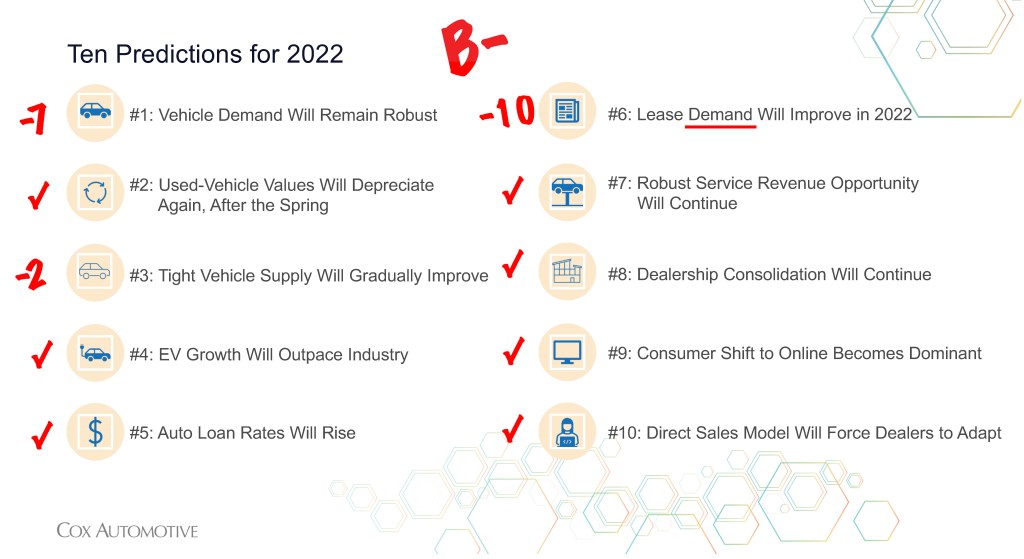Smoke on Cars
Cox Automotive’s Ten Predictions for 2022 Miss on Overall Demand, Leasing, New-Vehicle Inventory
Thursday September 29, 2022
As we did at the end of the second quarter, our team took a look back at the market predictions we posted in January. This quarterly review is helpful, as it allows us to see how the market has progressed compared to expectations. Forecasting is a tough business, especially in a year with so many changing market dynamics, but many of our initial predictions have held up reasonably well. As was the case at the end of last quarter, we have fallen short in three areas.
- We predicted vehicle demand would remain robust in 2022 but sales year to date are well off last year’s pace. Total retail sales did not improve in Q3. The third quarter saw the bite of higher rates, particularly in the used-vehicle market. Stubborn inflation has been the headline this year, and the Federal Reserve has moved aggressively to tackle it. We fully expected interest rates to increase in 2022 – as noted in prediction #5 – but the size and rate of the increases have surprised even us.
The Fed is aggressively moving to reduce demand, and that’s exactly what the Fed is getting. Higher interest rates have already impacted the housing market, and the auto industry is now feeling that pain as well. We are seeing softening prices, increasing inventory levels, and indications that buyers, particularly those with subprime credit ratings, are falling out of the market. Demand for new and used vehicles is no longer robust. As they say, you can’t fight the Fed. Our #1 prediction was wrong. Points off.
- We again fully acknowledge that our initial expectation of improving vehicle inventory in 2022 has not materialized as we had thought it would. Yes, used-vehicle inventory is notably higher than in 2021 and, generally, is back above historic norms. New-vehicle inventory, however, remains stubbornly tight. Slower sales and some production improvements are helping, and new-vehicle inventory volume at the end of Q3 is up 40% from the same period in 2021. Even U.S. auto dealers are indicating that inventory is improving. But both new-vehicle inventory volume and days’ supply remain far below historic norms, so we can’t take full points on this prediction, but our score has improved since Q2.
- Points have to be taken away for expecting leasing demand to improve in 2022. We do think the demand is there, but we can’t take credit for lease demand when lease penetration has fallen further. In this tight-inventory market, automakers are not pushing lease deals, and overall new-vehicle demand is showing signs of waning. In 2019, leasing accounted for roughly 30% of the retail market. In 2022, thanks to a number of factors, leasing will likely account for closer to 20% of retail, well below historic norms. We do believe leasing share will improve at some point, but that is not the case in 2022. On this topic we take all the points away.

While those three items definitely brought down our grade for the 2022 Predictions, we did get many of the other points right. The electric-vehicle segment has gained share as we expected and, as noted above, auto loan rates are definitely on the rise. Used vehicles are depreciating assets again, after an unprecedented run-up in 2021, and service revenue continues to be robust, despite a decline in service volume. Dealership consolidation and a major shift in how consumers are buying cars continue to be headline makers this year.
Overall, while the only perfect crystal balls are in Disney movies, our Ten Predictions for 2022 are holding up reasonably well. Our grade through Q3 is a B-. With the economy struggling and inflation impacting many households, demand has not materialized as we had expected back in January. We will have a final assessment at the end of the year and, hard to believe, we are already considering a new set of predictions for 2023. It’s about that time again!
Jonathan Smoke is chief economist at Cox Automotive.
